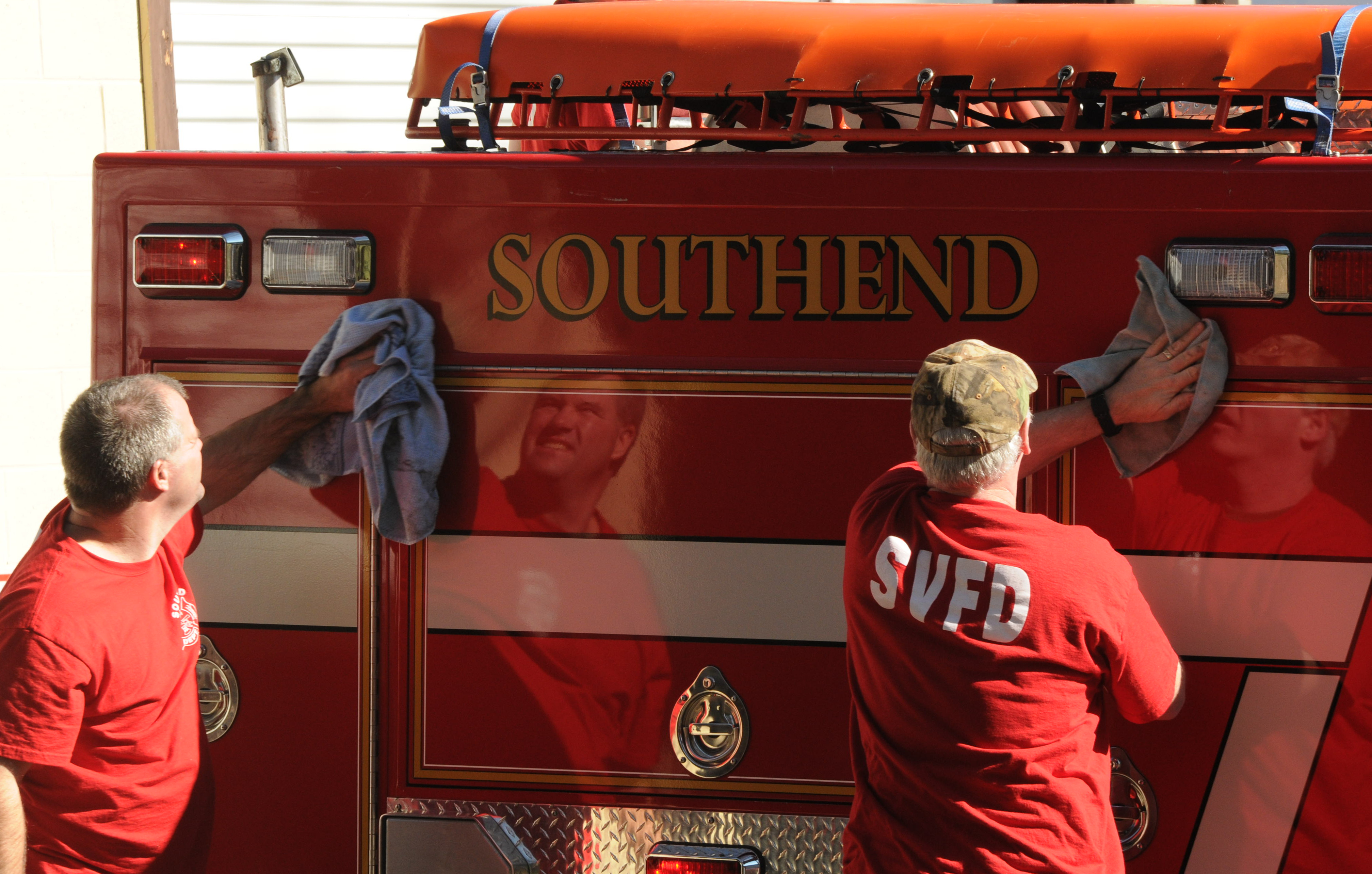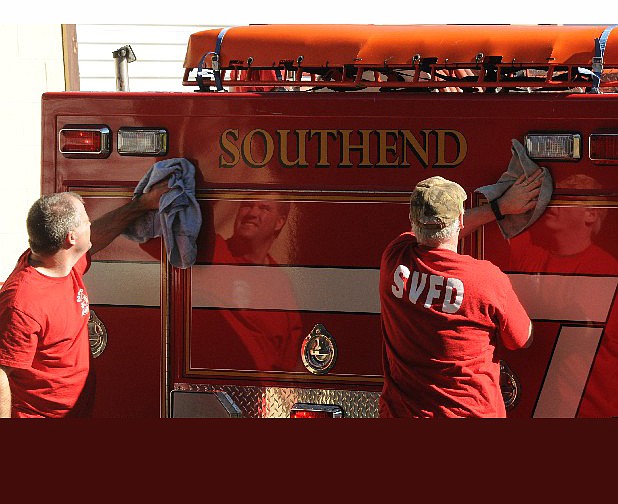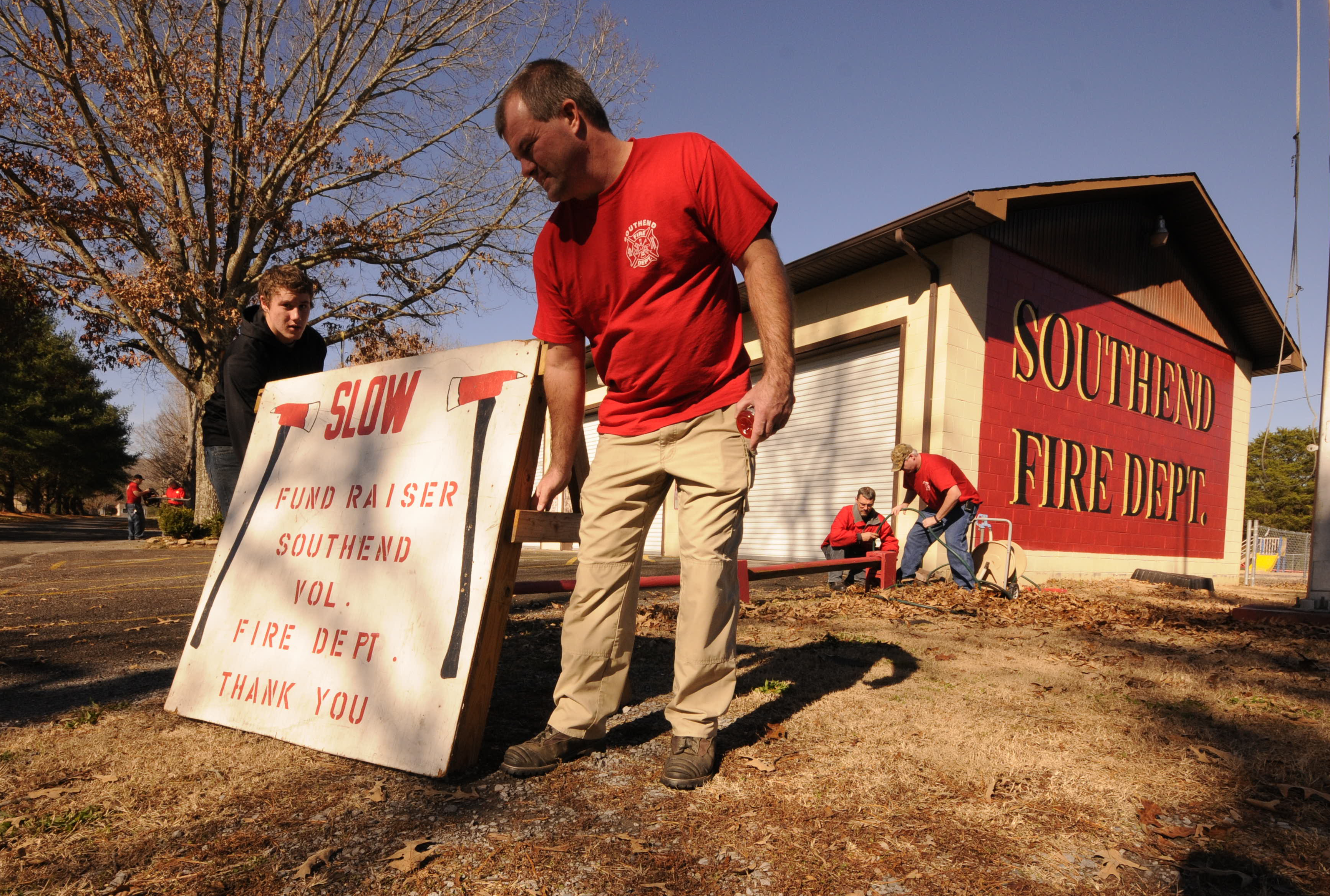It's not easy to run a volunteer fire department when your best source of income comes from fundraising roadblocks that now have drawn the attention of Tennessee state troopers.
For years, volunteer fire departments, charitable organizations, church groups and sports teams all over the region, South and country have manned street corners and intersections calling for donations.
But not without controversy.
Media reports from recent years indicate that the issue arises frequently, especially in small communities.
Recently in Sequatchie County, Tenn., Southend Volunteer Fire Department members were told by a state trooper to get out of the road because the fundraiser roadblock they were holding was "illegal."
Southend firefighter Tonya Herron and her husband and Chief Ken Herron said it cost a little under $39,000 last year to cover fire hall utilities, firetruck payments, fuel, equipment and building maintenance. The department covers about 2,800 homes.
Sequatchie County government kicks in $10,000 a year, but the rest comes from fundraising.
Most volunteer fire departments face the same issues, they said, and roadblocks almost universally are the most productive fundraisers.
For Southend, each of the four roadblock fundraisers the department holds each year brings in between $1,500 and $2,500. That's enough to make the largest of the department's two fire truck payments of $8,134 and $3,555, Herron said.
But Southend's last roadblock was cut short by a trooper who said there had been a complaint and that they couldn't legally hold a roadblock on state Highway 28 under Tennessee law.
"We've done if for 25 years and we're just now finding out that it's illegal," Tonya Herron said.
Herron said fire department members have always tried to set up the roadblock with safety in mind, but they don't want to break the law.
"Since it [Southend] began in 1988, they've done roadblocks," she said. "We put our truck in the middle of the road and take up money. We put signs about a half-mile out saying there's a fire department fundraiser ahead and we put out cones."
But Tennessee Highway Patrol Lt. John Harmon, a longtime trooper in the Chattanooga district, said the roadblock Herron referred to was halted by a trooper after a complaint about safety around the fundraising spot along Sequatchie County's piece of state Highway 28.
Harmon said enforcement has been stepped up across the district in recent years in response to heavier traffic and more driver distractions.
"We're not citing anybody. We're trying to educate them in the rules," Harmon said. "We've started getting a lot of complaints on those, not necessarily just at Southend but in other parts of the area.
 Southend Volunteer Fire Department Chief Ken Herron, left, cleans the side of their Ford F-550 brush truck with the help of volunteer firefighter Bobby Van Rohr. The department can no longer conduct fundraising "roadblocks" as they have in the past and hope the loss of revenue can be made up another way.
Southend Volunteer Fire Department Chief Ken Herron, left, cleans the side of their Ford F-550 brush truck with the help of volunteer firefighter Bobby Van Rohr. The department can no longer conduct fundraising "roadblocks" as they have in the past and hope the loss of revenue can be made up another way."Ball teams have started doing the same thing," Harmon said. "There are other parts of the state -- our area and other communities -- that it's gotten out of hand."
There are rules, and it is legal to hold roadblocks for certain groups, in certain places under certain conditions.
"For years, people have done those roadblocks, rescue squads and fire departments," Harmon said. "Well, times have changed. There's more traffic, more distracted driving and the last thing we want is for somebody to get hurt."
So, then, the rules.
In Tennessee there are three main points and they fall under state law dealing with anyone blocking or making passage "unreasonably inconvenient" for public access to any "highway, street, sidewalk, railway, waterway, elevator, aisle or hallway ..."
First, groups holding a fundraising roadblock must be a nonprofit organization that has received a 501(c)(3) or (4) designation from the IRS, and, second, they must have the written permission of the head of the local law enforcement jurisdiction at the roadblock location (usually a police chief or sheriff) for the time and place. Finally, the roadblock must be conducted at an intersection where traffic must stop in all directions and drivers with a green light should not be distracted by group members.
Harmon said troopers holding roadblocks have to follow the same rules and more under their own policies for the safety of the officers conducting them.
The Herrons say theirs and most volunteer fire departments are officially tax-exempt so they can receive funding from their local governments, so there is a way to do their fundraisers if they follow the rules. Southend's hurdle is an intersection with a four-way stop.
Every state's rules are different, though.
In Georgia, state law says no one can stand in the roadway to solicit a ride, employment, business or "contributions from occupants of any vehicle," according to Georgia State Patrol officials. A second code states that municipalities and county governments are authorized to adopt ordinances for the issuance of permits for soliciting contributions on streets and highways in their jurisdictions.
That's what Chickamauga did.
Chickamauga, Ga., City Manager Michael Haney said a few years ago the small Walker County town's streetscaping project made the downtown area attractive for fundraising, a little too attractive in the eyes of some motorists who complained about safety, especially when it came to local sports teams.
Georgia law cited by state patrol officials goes on to describe "charitable organizations," as those with the same 501(c)(3) designation that Tennessee does, and specifies that they be registered with the Secretary of State.
Georgia State Patrol officials said most complaints are usually made to local authorities, who deal with situations as they see fit.
In Alabama, the issue is left to local governments aside from the state law that addresses people standing on the side of the road in the sense of hitchhiking. The law also applies to people fishing from bridges and those seeking "contributions from the occupant of any vehicle" unless they have authorization in the form of a permit from of the local government body having jurisdiction, Department of Safety Sgt. Steve Jarrett said.
"I've seen that happen a lot in the city that I live in, and I just assume that they have a city ordinance. But out in the rural parts of the county you have a lot of volunteer firefighters and they've started doing 'fill the boot.' You don't see them very often but I have seen them out," Jarrett said.
"We have discretion if they're not hurting anything, it's not a complaint from citizens or something like that; each officer has discretion how he wants to handle it. You don't have to issue citations or make arrests if you can resolve it," Jarrett said, noting he wasn't aware of any recent complaints made to state troopers.
"But according to this law, if they don't have a permit they're in violation," he said.
Law enforcement officers agree that the main point is safety.
Tonya Herron said recent alternative fundraisers, a chili supper and a door-to-door campaign, brought in a few hundred dollars but it's not enough to be sure of keeping up the firetruck payments.
Ken Herron's "aunt and uncle and a close friend started the fire hall," she said. "If it goes under, it's just going to break their hearts."
Contact staff writer Ben Benton at bbenton@timesfreepress.com or 423-757-6569.

